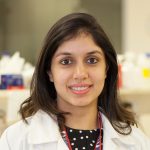Prof Judy de Haan – President, VIC
 Judy de Haan [B.Sc(Hons), PhD] is Head of the Cardiovascular Inflammation and Redox Biology (CIRB) Laboratory (formerly the Oxidative Stress Laboratory) at the Baker Heart and Diabetes Institute, Melbourne, Australia. She holds adjunct positions at Swinburne Uni, La Trobe Uni, Melbourne and Monash Uni. Prof de Haan obtained a BSc (Hons) and Master’s degree from the University of Cape Town, South Africa and a PhD from Monash
Judy de Haan [B.Sc(Hons), PhD] is Head of the Cardiovascular Inflammation and Redox Biology (CIRB) Laboratory (formerly the Oxidative Stress Laboratory) at the Baker Heart and Diabetes Institute, Melbourne, Australia. She holds adjunct positions at Swinburne Uni, La Trobe Uni, Melbourne and Monash Uni. Prof de Haan obtained a BSc (Hons) and Master’s degree from the University of Cape Town, South Africa and a PhD from Monash
University. She was recruited to the Baker Institute as a Leader of the Oxidative Stress Lab which she established in 2004. In 2017, she was appointed a Baker Fellow and Head of the CIRB Laboratory. In 2019 she was appointed a member of the Drug Discovery and Translation Flagship of the Australian Cardiovascular Alliance (ACvA). Her research aims to improve the lives of diabetic patients by reducing the burden of cardiovascular complications. In particular, she focusses on reducing the pathogenic consequences of inflammatory and oxidant stress in diabetic cardiovascular complications.
Professor Andrew Murphy – Incoming President, VIC
 Professor Andrew Murphy is the Head of the Heart Attack Program at the Baker Heart and Diabetes Institute. He is currently a NHMRC Investigator grant recipient. Andrew trained with Prof. Alan Tall’s group at Columbia University as an American
Professor Andrew Murphy is the Head of the Heart Attack Program at the Baker Heart and Diabetes Institute. He is currently a NHMRC Investigator grant recipient. Andrew trained with Prof. Alan Tall’s group at Columbia University as an American
Heart Association Fellow, discovering several pathways contributing to enhanced immune cell production in metabolic disorders. In 2013 he returned to Australia to begin his own group. His work largely focuses on how inflammatory diseases contribute to cardiovascular disease through alterations in haematopoiesis. He has published over 150 manuscripts with a H-index of 56 in leading journals including Nature Medicine, Nature Cell Biology, Cell Stem Cell, Cell Metabolism, Circulation, etc.
Dr Kristen Bubb – Secretary, VIC
 Kristen Bubb is currently a group leader in the Biomedicine Discovery Institute and Victorian Heart Institutes at Monash University. Kristen obtained her PhD in 2010 at Monash University, working on the developmental origins of cardiovascular disease. She then moved to London to work in Vascular Pharmacology where she was funded by a fellowship from the British Pharmacological Society, before being recruited to the new William Harvey Heart Centre for a post-doctoral position in Cardiovascular Pharmacology. She was then recruited to the University of Sydney, Kolling Institute of Medical Research in 2015 to co-lead the Oxidative Signalling Laboratory with Prof Gemma Figtree and developed a research program of investigating novel therapeutics and signalling pathways applicable to vascular diseases. At the end of 2019 Kristen started in her current position to establish a new laboratory in partnership with Prof Stephen Nicholls. Her main research interests are to investigate inflammatory signalling in vascular diseases, with the aim of developing novel therapeutics for vascular diseases such as atherosclerosis and pulmonary hypertension.
Kristen Bubb is currently a group leader in the Biomedicine Discovery Institute and Victorian Heart Institutes at Monash University. Kristen obtained her PhD in 2010 at Monash University, working on the developmental origins of cardiovascular disease. She then moved to London to work in Vascular Pharmacology where she was funded by a fellowship from the British Pharmacological Society, before being recruited to the new William Harvey Heart Centre for a post-doctoral position in Cardiovascular Pharmacology. She was then recruited to the University of Sydney, Kolling Institute of Medical Research in 2015 to co-lead the Oxidative Signalling Laboratory with Prof Gemma Figtree and developed a research program of investigating novel therapeutics and signalling pathways applicable to vascular diseases. At the end of 2019 Kristen started in her current position to establish a new laboratory in partnership with Prof Stephen Nicholls. Her main research interests are to investigate inflammatory signalling in vascular diseases, with the aim of developing novel therapeutics for vascular diseases such as atherosclerosis and pulmonary hypertension.
Ms Jennifer Seabrook – Treasurer/Governance, VIC
 Jennifer Seabrook [BSc(Hons), GAICD] was first associated with the AAS in the late 1980s as a member, and worked closely with several clinical members as Clinical Research Manager, including managing the LIPID Study for Bristol-Myers Squibb. When she and Ray established their consultancy, AAS was their first client with the design of the previous logo. From 2000, Jennifer managed the AAS business affairs and conferences, before accepting AAS Life Membership on retirement in 2014. Jennifer was invited onto the Executive in 2021 and brings significant corporate history to the team.
Jennifer Seabrook [BSc(Hons), GAICD] was first associated with the AAS in the late 1980s as a member, and worked closely with several clinical members as Clinical Research Manager, including managing the LIPID Study for Bristol-Myers Squibb. When she and Ray established their consultancy, AAS was their first client with the design of the previous logo. From 2000, Jennifer managed the AAS business affairs and conferences, before accepting AAS Life Membership on retirement in 2014. Jennifer was invited onto the Executive in 2021 and brings significant corporate history to the team.
Dr Amy Baxter – Assistant Treasurer, VIC
 Dr Amy Baxter completed her PhD in 2017 with Prof Mark Hulett (LIMS) at La Trobe University, (Melbourne, VIC, Australia) investigating protein-phospholipid membrane interactions in the anticancer mechanism of host defense peptides. She then received an NHMRC Peter Doherty Early Career Fellowship (2018-2021) which she completed with Prof Ivan Poon whose group investigates the release of extracellular vesicles from dying cells, defining novel regulators in the apoptotic cell disassembly pathway and aiming to understand how dysfunctions in this process contribute to disease e.g. autoimmunity, infection and cardiovascular disease. In 2022, Dr Baxter was awarded a La Trobe University Tracey Banivanua Mar Research Fellowship (2022-2025) where she now heads the Vascular Cell Death, Clearance & Inflammation group within the Biochemistry & Chemistry Department and leads the ‘Dying Cell Communication & Clearance’ division of La Trobe’s Centre for Cardiovascular Biology & Disease Research. Her team investigates the mechanisms and functions of apoptotic cell clearance (efferocytosis) by vascular cells, using a combination of cell-based and in vivo (zebrafish and mouse) approaches to examine the effects of boosting efferocytosis on tissue repair. Through this work, her team hopes to identify novel therapeutic targets for the treatment of vascular diseases including atherosclerosis, diabetes and stroke. Dr Baxter’s research has been acknowledged through several prestigious awards including Australian Society for Biochemistry & Molecular Biology Fred Collins Award (2020), International Society for Extracellular Vesicles Young Investigator Award (2020) and Australasian Cell Death Society Career Development Award (2021). In 2024 she was awarded a National Heart Foundation Vanguard Grant (2024-2025) to investigate novel genetic and pharmacological approaches to promote efferocytosis in atherosclerosis and is the recent recipient of a 2025 National Heart Foundation L1 Future Leader Fellowship to expand this research program.
Dr Amy Baxter completed her PhD in 2017 with Prof Mark Hulett (LIMS) at La Trobe University, (Melbourne, VIC, Australia) investigating protein-phospholipid membrane interactions in the anticancer mechanism of host defense peptides. She then received an NHMRC Peter Doherty Early Career Fellowship (2018-2021) which she completed with Prof Ivan Poon whose group investigates the release of extracellular vesicles from dying cells, defining novel regulators in the apoptotic cell disassembly pathway and aiming to understand how dysfunctions in this process contribute to disease e.g. autoimmunity, infection and cardiovascular disease. In 2022, Dr Baxter was awarded a La Trobe University Tracey Banivanua Mar Research Fellowship (2022-2025) where she now heads the Vascular Cell Death, Clearance & Inflammation group within the Biochemistry & Chemistry Department and leads the ‘Dying Cell Communication & Clearance’ division of La Trobe’s Centre for Cardiovascular Biology & Disease Research. Her team investigates the mechanisms and functions of apoptotic cell clearance (efferocytosis) by vascular cells, using a combination of cell-based and in vivo (zebrafish and mouse) approaches to examine the effects of boosting efferocytosis on tissue repair. Through this work, her team hopes to identify novel therapeutic targets for the treatment of vascular diseases including atherosclerosis, diabetes and stroke. Dr Baxter’s research has been acknowledged through several prestigious awards including Australian Society for Biochemistry & Molecular Biology Fred Collins Award (2020), International Society for Extracellular Vesicles Young Investigator Award (2020) and Australasian Cell Death Society Career Development Award (2021). In 2024 she was awarded a National Heart Foundation Vanguard Grant (2024-2025) to investigate novel genetic and pharmacological approaches to promote efferocytosis in atherosclerosis and is the recent recipient of a 2025 National Heart Foundation L1 Future Leader Fellowship to expand this research program.
Prof. Girish Dwivedi – WA

Professor Dwivedi [MD, PhD (UK), FRACP, FESC, FSCCT] is the inaugural Wesfarmers Chair in Cardiology at the University of Western Australia (Harry Perkins Institute of Medical Research) and Consultant Cardiologist at Fiona Stanley Hospital, Murdoch, Perth. Prior to taking up this position in 2017, he was appointed as a Clinician Scientist and Consultant Cardiologist at the University of Ottawa Heart Institute (UOHI), Canada. His background and training to date is unique and he is one of a few cardiologists in Australia who have advanced (level 3) multimodality imaging training. He has received accreditations in Cardiac CT (Society of Cardiovascular Computed Tomography), echocardiography (American Society of Echocardiography comprehensive examination certification and European Society of Cardiology-) and American Board Certifications in Cardiac Magnetic Resonance (Society for Cardiovascular Magnetic Resonance – USA), and Nuclear Cardiology including PET (Certification Board of Nuclear Cardiology -USA). He completed his PhD (2010) in non-invasive cardiac imaging with the University of Manchester (UK).. His funding (>30 million) and publication successes highlight both the high level of research intensity and productivity. He has several (> 250 manuscripts accepted or published) noteworthy publications.
Dr Denuja Karunakaran – VIC

Denuja Karunakaran completed her PhD at Monash University, followed by a Heart Foundation Postdoctoral Fellowship at UNSW, an Endowed Cardiovascular Genetics Fellowship at the Ottawa Heart Institute, Canada and a IMB Fellowship at The University of Queensland. In August 2022, she established her independent laboratory at the Victorian Heart Hospital, Monash University, where they focus in understanding mechanisms of cardiometabolic diseases (e.g. atherosclerosis, obesity, diabetes) and their interactions that accelerate the progression of these diseases. Cardiometabolic Immunity Laboratory broadly focuses on inflammation, necroptosis, efferocytosis (clearance of dying cells) and the circadian clock in cardiometabolic diseases, with the ultimate focus of identifying novel therapeutic targets to improve patient outcomes. Dr Karunakaran’s research is funded by NHMRC and Diabetes Australia.
Dr Sam Lee – VIC
 Sam is a Group Leader in the Division of Immunometabolism of Baker Heart and Diabetes Institute directed by Prof Andrew Murphy. Sam completed his PhD in 2017 and joined Prof Andrew Murphy’s group in the Haematopoiesis and Leukocyte Biology Lab at Baker. He has been a recipient of the National Heart Foundation Postdoctoral Fellowship and the NHF Paul Korner Award. His work focuses on how dietary risk factors contribute to cardiovascular disease. He has published a number of manuscripts in leading journals such as The Journal of Clinical Investigation and Arteriosclerosis, Thrombosis and Vascular Biology.
Sam is a Group Leader in the Division of Immunometabolism of Baker Heart and Diabetes Institute directed by Prof Andrew Murphy. Sam completed his PhD in 2017 and joined Prof Andrew Murphy’s group in the Haematopoiesis and Leukocyte Biology Lab at Baker. He has been a recipient of the National Heart Foundation Postdoctoral Fellowship and the NHF Paul Korner Award. His work focuses on how dietary risk factors contribute to cardiovascular disease. He has published a number of manuscripts in leading journals such as The Journal of Clinical Investigation and Arteriosclerosis, Thrombosis and Vascular Biology.
Dr Arpeeta Sharma – VIC
 Arpeeta is currently a research fellow in the Department of Diabetes, Monash University. She holds a BSc Hons (King’s College, London), and Masters and PhD in Pharmacology from University of British Columbia, Vancouver, Canada. Arpeeta was the recipient of an NHMRC Peter Doherty Early Career Fellowship and did her Post-doctoral studies under the supervision of Prof Judy de Haan at the Baker Heart and Diabetes Institute. Arpeeta has a proven track record in cardiovascular biology, in particular diabetes associated cardiovascular complications, endothelial dysfunction and atherosclerosis. She has held several project grants, including two Diabetes Australia Research Program General Grants and a Bayer Pharmaceuticals grant for New Indications. Her research focuses on identifying novel therapeutic strategies to target inflammation and oxidative stress in diabetes-associated vascular diseases.
Arpeeta is currently a research fellow in the Department of Diabetes, Monash University. She holds a BSc Hons (King’s College, London), and Masters and PhD in Pharmacology from University of British Columbia, Vancouver, Canada. Arpeeta was the recipient of an NHMRC Peter Doherty Early Career Fellowship and did her Post-doctoral studies under the supervision of Prof Judy de Haan at the Baker Heart and Diabetes Institute. Arpeeta has a proven track record in cardiovascular biology, in particular diabetes associated cardiovascular complications, endothelial dysfunction and atherosclerosis. She has held several project grants, including two Diabetes Australia Research Program General Grants and a Bayer Pharmaceuticals grant for New Indications. Her research focuses on identifying novel therapeutic strategies to target inflammation and oxidative stress in diabetes-associated vascular diseases.
Dr Joanne Tan – SA
 Joanne Tan is a senior postdoctoral researcher with the Heart Health Theme at the South Australian Health & Medical Research Institute. Prior to this, she was at the Heart Research Institute where she investigated the vasculo-protective effects of HDL. Since 2011, her research focusses on the mechanisms underpinning the ability of HDL to regulate angiogenesis. She now seeks to identify novel therapeutic targets to relieve the debilitating effects of diabetic vascular complications.
Joanne Tan is a senior postdoctoral researcher with the Heart Health Theme at the South Australian Health & Medical Research Institute. Prior to this, she was at the Heart Research Institute where she investigated the vasculo-protective effects of HDL. Since 2011, her research focusses on the mechanisms underpinning the ability of HDL to regulate angiogenesis. She now seeks to identify novel therapeutic targets to relieve the debilitating effects of diabetic vascular complications.
Professor Gerald Watts – Chair, FHAN, WA
 Gerald Watts (DSc, MD, PhD, FRCP, FRACP) is a Professor in the Medical School, University of Western Australia and a consultant clinician and Head of the Lipid Disorders Clinic at Royal Perth Hospital. Gerald has had a long-held, internationally recognised interest in Familial Hypercholesterolaemia (FH) and was the driving force behind the AAS’s establishment of the FH Australasian Network and the FH Registry.
Gerald Watts (DSc, MD, PhD, FRCP, FRACP) is a Professor in the Medical School, University of Western Australia and a consultant clinician and Head of the Lipid Disorders Clinic at Royal Perth Hospital. Gerald has had a long-held, internationally recognised interest in Familial Hypercholesterolaemia (FH) and was the driving force behind the AAS’s establishment of the FH Australasian Network and the FH Registry.
A/Professor David Sullivan – Chair, Clinical Council, NSW
 David Sullivan is a physician and chemical pathologist in the Department of Clinical Biochemistry at Royal Prince Alfred Hospital. This includes conjoint appointment as Associate Professor, Faculty of Medicine at the University of Sydney Central Clinical School. David has a long-term interest in lipid metabolism with particular emphasis on the environmental component (especially dietary) of gene – environment interactions contributing to cardiovascular disease. He has been involved in the early use of many forms of lipid-lowering intervention and has a particular interest in interventions arising from nutritional principles, such as the cholesterol-lowering effect of plant sterols. His other main interest is the improvement of detection and management of severe inherited dyslipidaemia, such as that seen in Familial Hypercholesterolaemia.
David Sullivan is a physician and chemical pathologist in the Department of Clinical Biochemistry at Royal Prince Alfred Hospital. This includes conjoint appointment as Associate Professor, Faculty of Medicine at the University of Sydney Central Clinical School. David has a long-term interest in lipid metabolism with particular emphasis on the environmental component (especially dietary) of gene – environment interactions contributing to cardiovascular disease. He has been involved in the early use of many forms of lipid-lowering intervention and has a particular interest in interventions arising from nutritional principles, such as the cholesterol-lowering effect of plant sterols. His other main interest is the improvement of detection and management of severe inherited dyslipidaemia, such as that seen in Familial Hypercholesterolaemia.
